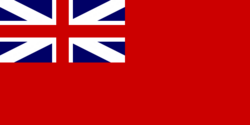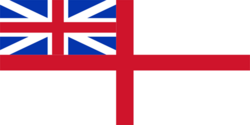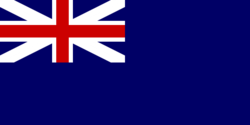Work in progress - this page and its sub-pages are not done
Update / add word-links
¶ Nations - playable:
Four national powers are vying for control of the Caribbean in Pirates of the Burning Sea.
- France / French / Frogs
- Great Britain / British / Brits
- Pirates / Pirate / Rats
- Spain / Spanish / Dons
¶ Nation non-playable:
¶ The Netherlands
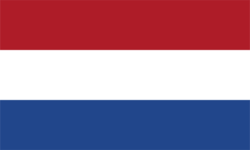
Flag of the Netherlands, circa 1720.
The Netherlands is a non-playable nation in Pirates of the Burning Sea and does not vie for control of the Caribbean.
Their presence in the Caribbean is small compared to the other nations.
¶ Ports
The Netherlands has a Regional Auction House in Oranjestad.
Factions
Dutch West India Company has Euro-Traders in Tortuga and Oranjestad.
¶ Factions
¶ Académie Nationale
The Académie Nationale des Sciences (or Académie Nationale for short) is faction of the French Nation. It is headquartered in Pointe-à-Pitre and serves as a rival to the British Royal Society of Science. The Académie Nationale offers missions in Pointe-à-Pitre, Roseau and Vieux Fort.
¶ History
The French Academy of Sciences (French: Académie des sciences) is a learned society, founded in 1666 by Louis XIV at the suggestion of Jean-Baptiste Colbert, to encourage and protect the spirit of French scientific research. It was at the forefront of scientific developments in Europe in the 17th and 18th centuries. It is one of the earliest academies of sciences.
The Academy of Sciences owes its origin to Colbert's plan to create a general academy. He chose a small group of scholars who met on December 22, 1666 in the King's library, and thereafter held twice-weekly working meetings there. The first 30 years of the Academy's existence were relatively informal, since no statutes had as yet been laid down for the institution.
On January 20, 1699, Louis XIV gave the Company its first rules. The Academy received the name of Royal Academy of Sciences and was installed in the Louvre in Paris. On August 8, 1793, the National Convention abolished all the academies. On August 22, 1795, a National Institute of Sciences and Arts was put in place, bringing together the old academies of the sciences, literature and arts, among them the Académie française and the Académie des sciences. Almost all the old members of the previously abolished Académie were formally re-elected and retook their ancient seats. Among the exceptions was Dominique, comte de Cassini who refused to take his seat. In 1816, the once again Royal Academy of Sciences became autonomous, while forming part of the Institute of France; the head of State became its patron. The Academy proceedings were published under the name Comptes rendus de l'Académie des sciences (1835-1965). The publications can be found on the French National Library in pdf format.
¶ Sources
Source: Wikipedia article on French Academy of Sciences
¶ Board of Marque
You may not remember this, but there was a time when a British Privateer in these waters was very likely a pirate. They'd pick up their letters of marque from corrupt governors, then indulge in a bit of sea-robbery, all the while claiming the legitimacy and authority of the Crown. Those days are long past, due in part to the Board of Marque. The Board is a new regulatory agency formed specifically to audit the conduct of Britain's privateers and stamp out the most unruly piracy in British waters.
The Board of Marque is the British Privateer guild. The organization is responsible for the appointment and regulation of British Privateers and are primarily based out of the British Capital City of Port Royal.
Members are allowed exclusive access to The St. George meeting hall there.
British Reputation maybe gained with them by speaking with the Pirate Hunters in Georgetown, Belize and of course Port Royal. The Pirate Hunters in those ports have bounties for captains with appropriate experience.
¶ Brethren of the Coast
The primary faction of the Pirate Nation to which players may belong.
In the PotBS context, the founder and leader of the Brethren is William Kidd, and they function as the Pirates' National Navy (i.e. the equivalent of the national Navies of Britain, France and Spain).
¶ History
The Brethren or Brethren of the Coast were a loose coalition of pirates and privateers commonly known as buccaneers and active in the seventeenth and eighteenth centuries in the Atlantic Ocean, Caribbean Sea and Gulf of Mexico.
They were a syndicate of captains with letters of marque and reprisal who regulated their privateering enterprises within the community of privateers and with their outside benefactors. They were primarily private individual merchant mariners of Protestant background usually of English and French origin.
During their heyday when the Thirty Years War was devastating the Protestant communities of France, Germany, and the Netherlands and England was engaged in various conflicts, the privateers of these nationalities were issued letters of marque to raid Catholic French and Spanish shipping and territories.
Based primarily on the island of Tortuga off the coast of Haiti and the city of Port Royal on the island of Jamaica. The original Brethren were mostly French Huguenot and British Protestants, but their ranks were joined by other adventurers of various nationalities including, Spaniards, and even African sailors, as well as escaped slaves and outlaws of various sovereigns.
In keeping with their Protestant and mostly Common Law heritage the Brethren were governed by codes of conduct that favored legislative decision-making, hierarchical command authority, individual rights, and equitable division of revenues.
Henry Morgan is perhaps the most famous member of the Brethren and the one usually noted with codifying its organization. However, following the demographic changes which featured the rise of slave labor in the Caribbean islands, most maritime families moved to the mainland colonies of the future United States or to their home countries. A few, unable to compete effectively with slave labor, enamored of easy riches, or out of angst continued to maintain the Brethren of the Coasts as a purely criminal organization which preyed upon all civilian maritime shipping. This second era of the Brethren began the start of the age of piracy and brigandage which featured the Caribbean until socioeconomic and military changes of the late 18th and early 19th century finally broke its back......
¶ Sources
¶ British East India Company
A faction of the British Nation.
¶ History
The Honourable East India Company (HEIC), most commonly referred to as the East India Trading Company, though often colloquially referred to as "John Company", and simply as the East India Company or the "Company Bahadur" in India, was an early joint-stock company (the Dutch East India Company was the first to issue public stock). The company's main trade was in cotton, silk, indigo dye, saltpetre, tea and opium. It was granted an English Royal Charter by Elizabeth I on December 31, 1600, with the intention of favouring trade privileges in India. The Royal Charter effectively gave the newly created HEIC a 21-year monopoly on all trade in the East Indies. The Company transformed from a commercial trading venture to one that virtually ruled India and other Asian colonies as it acquired auxiliary governmental and military functions, until the British Crown assumed direct rule in 1858 following the events of the Indian Rebellion of 1857.
Need a faction no lower then -550 with British East India Company. If faction is too low they offer a mission to gain 100 faction.
¶ British Royal Society
¶ Actual History
The origins of the Royal Society lie in an 'invisible college' of natural philosophers who began meeting in the mid-1640s to discuss the new philosophy of promoting knowledge of the natural world through observation and experiment, which we now call science.
Its official foundation date is 28 November 1660, when a group of 12 met at Gresham College after a lecture by Christopher Wren, then the Gresham Professor of Astronomy, and decided to found 'a Colledge for the Promoting of Physico-Mathematicall Experimentall Learning'. This group included Wren himself, Robert Boyle, John Wilkins, Sir Robert Moray, and William, Viscount Brouncker.
The Society was to meet weekly to witness experiments and discuss what we would now call scientific topics. The first Curator of Experiments was Robert Hooke. It was Moray who first told the King, Charles II, of this venture and secured his approval and encouragement. At first apparently nameless, the name The Royal Society first appears in print in 1661, and in the second Royal Charter of 1663 the Society is referred to as 'The Royal Society of London for Improving Natural Knowledge'.
The Society found accommodation at Gresham College and rapidly began to acquire a library (the first book was presented in 1661) and a repository or museum of specimens of scientific interest. After the Fire of 1666 it moved for some years to Arundel House, London home of the Dukes of Norfolk. It was not until 1710, under the Presidency of Isaac Newton, that the Society acquired its own home, two houses in Crane Court, off the Strand.
From the beginning, Fellows of the Society had to be elected, although the criteria for election were vague and the vast majority of the Fellowship were not professional scientists. In 1731 a new rule established that each candidate for election had to be proposed in writing and this written certificate signed by those who supported his candidature. These certificates survive and give a glimpse of both the reasons why Fellows were elected and the contacts between Fellows.
¶ In Game
You gain reputation with the BRS by running missions in Port Royal, Rosseau and Point-a-Pitre and by sinking Fairfax Pirates for reputation. Fairfax pirates are often found lurking around St. Johns.
Once you are esteemed (2500 points) the missions in Riding rocks are unlocked and you can pick up special items including a pistol as you work you way to Celebrated.
In-game, the BRS is competing against the French Academie Nationale.
¶ British Trade Union
The BTU control the Auction houses at British ports. There are a number of missions that can raise the BTU Reputation.
¶ Corsarios del Rey
f you were ever to go into privateering, don't as a Corsario del Rey. The Corsarios are paid terribly, cheated on every prize they sell to The House of Trade, disrespected by the Armada, and routinely called upon only when the butcher's bill is so long, no sane admiral would have any hope left of salvaging a mission. Even so, the Corsarios del Rey time and again emerge victorious. They are some of the toughest, most stubborn privateers in the Carribean. The Corsarios need all the help they can get and you'll never meet a more loyal and deicated friend than a Corsario del Rey.
The Spanish Privateer Faction
Their Office is located in San Juan, contact Felix Cahera.
Regional Mission Contacts
In Villa Hermosa, chat with Bernardo Esposito.
In Maracaibo, chat with Zara Dominguez.
Spanish Reputation maybe gained with them by speaking with the Pirate Hunter's in Villa Hermosa, Maracaibo and of course San Juan. The Pirate Hunters in those ports have bounties for captains with appropriate experience.
¶ Dutch West India Company
The Dutch faction. Gaining Reputation with them gives you cheaper turn-ins with their Euro Traders, located at Oranjestad and Tortuga.
¶ History
Dutch West India Company (Dutch: Geoctroyeerde Westindische Compagnie or GWC; English: Chartered West India Company) was a company of Dutch merchants. Among its founding fathers was Willem Usselincx (1567-1647?). On June 3, 1621, it was granted a charter for a trade monopoly in the West Indies (meaning the Caribbean) by the Republic of the Seven United Netherlands and given jurisdiction over the African slave trade, Brazil, the Caribbean, and North America. The area where the company could operate consisted of West Africa (between the Tropic of Cancer and the Cape of Good Hope) and the Americas, which included the Pacific Ocean and the eastern part of New Guinea. The intended purpose of the charter was to eliminate competition, particularly Spanish or Portuguese, between the various trading posts established by the merchants. The company became instrumental in the Dutch colonization of the Americas.
¶ Organization and Activities
The GWC was organized similarly to the Dutch East India Company (Dutch: Vereenigde Oost-Indische Compagnie, abbreviated as VOC), which had a trade monopoly for Asia (mainly present Indonesia) from 1602, except for the fact that the GWC was not allowed to conduct military operations without approval of the Dutch government. Like the VOC, the company had five offices, called chambers (kamers), in Amsterdam, Rotterdam, Hoorn, Middelburg and Groningen, of which the chambers in Amsterdam and Middelburg contributed most to the company. The board consisted of 19 members, known as the Heeren XIX (the Lords Nineteen).
The company was initially relatively successful; in the 1620s and 1630s, many trade posts or colonies were established. The New Netherland area, which included New Amsterdam, covered parts of present-day New York, Connecticut, Delaware, and New Jersey. Other settlements were established on the Netherlands Antilles, several other Caribbean islands, Suriname and Guyana. The largest success for the GWC in its history was the seizure of the Spanish silver fleet, which carried silver from Spanish colonies to Spain by Piet Heyn in 1628; privateering was at first the most profitable activity. In 1630, the colony of New Holland (capital Mauritsstad, present-day Recife) was formed, taking over Portuguese possessions in Brazil. In Africa, posts were established on the Gold Coast (now Ghana) and briefly in Angola. In the Americas, fur (North America) and sugar (South America) were the most important trade goods, while African settlements traded slaves—mainly destined for the plantations on the Antilles and Suriname—gold and ivory.
¶ Decline and End
This chain of successes quickly ended, however. New Holland was lost to Portuguese Brazil in 1654, after a long war, and many other trading posts were also destroyed or captured by rivaling European nations. The New Netherland colonization effort did not spread further either, in part due to a fierce rivalry with the English, who conquered New Netherland in 1664, and in part due to the difficulty of attracting settlers under the company's initial policy of the Patroon system, which granted vast power over settlers to the men who brought them to the colony. After years of debts, the original GWC folded in 1674, and a new, reorganised company was formed. Piracy was abandoned, and the company concentrated mainly on the African slave trade and its remaining possessions in Suriname and the Antilles.
After the British took control of Suriname for several years in the 1780s, the GWC appeared unable to recover. In 1791, the company's stock was bought by the Dutch government, and its territories were placed under Dutch government control.
¶ French Mississippi Company
Historical Information
In the history of French trade, the French Mississippi Company was a chartered company first established in 1684.
It was founded at the request of René-Robert Cavelier, Sieur de La Salle, who having projected it in 1660, and being appointed Governor of Fort Frontenac, at the mouth of that river, travelled over the country in 1683, and returned to France to solicit its establishment.
This obtained, he set sail for his new colony, with four vessels loaded with inhabitants, etc; but upon entering the Gulf of Mexico, it seems he did not know the river that had cost him so much fatigue, for he settled on another, unknown river, where his colony perished by degrees. By 1685, there were fewer than 100 people left in the colony. Making several expeditions to find the Mississippi, he was killed in one of them by a party who mutinied against him, upon which the colony was dispersed and lost.
Pierre Le Moyne d'Iberville afterwards succeeded better; he found the Mississippi River, built a fort, and settled a colony. In 1718, the company had founded the city of New Orleans in the territory of Louisiana.
Source: French Mississippi Company - Wikipedia, the free encyclopedia
NPCs
Baptiste Drugeot
¶ French Navy
Members
Marcellin Royer
Pierre Savard
Rosette Sire
¶ French Trade Union
The FTU control the Auction houses in French ports. There are a number of missions that can raise FTU reputation.
NPCs
Cesar Bone
Lisette Aufroy
Fleet Ships
French Trader
Trade Union Treasure Ship
¶ Knights Templar
The Knights Templar were a Christian military order that was founded during the aftermath of the First Crusade in 1096 to ensure the safety of European pilgrims to Jerusalem. The Order stayed active and gained a considerable amount on influence in Europe over the next two centuries, before being officially condemned by the Pope in 1307, with many of its members arrested, tortured and burned at the stake.
Read the Wikipedia article about the Knights Templar.
In game the Knights Templar function as an independent faction, competing with The Inquisition. Its missions can be found in Santiago, Tortuga, and Port-de-Paix. Doing missions for the Knights will usually negatively affect your reputation with the Inquisition, but sinking Dread Saints Pirates ships on the open sea allow to increase reputation with both factions.
The exchange is represented by Brother Ohan in Santiago (pictured).
Missions can be obtained from Templar Agent and Mogens Brisebois in Tortuga, and Tomas Desoto in Port-de-Paix.
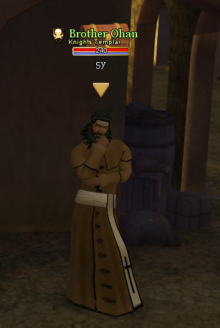
¶ Les Samedien
Les Samediens Pirates are a secondary NPC faction. Speak with the Pirate Hunter in Biloxi to obtain a Bounty for sinking them.
They have been spotted at the regions below.
Known Routes, Spots and Ships
Louisiana (Region)
Common ship levels are 22-24 and can go up to level 26, or slightly above.
¶ Parrots
Where there be Pirates, there are fanciful companions closeby, some pets may follow you about while others nimbly ride upon your shoulder.
There is a flock of very special Parrots whom are also located throughout the Caribbean.
You may spend Burning Sea Points in the Treasure Aisle store for a plethora of ingame available Pet choices. One may Follow and one may sit upon your shoulder. Some pets are Epic and would require they be unlocked upon completion of the storyline. Fortaleza da Luz is the Giant Scorpion.
¶ Pirate-only Tortuga Mission
Captain Billings' Bounty rewards a Green Shoulder Parrot
¶ Pillaged Ports Bounty Missions
Lord Wingston Beaksworth III is perched in West End and offers Beaksworth's PvP Bounty for sinking 5 British Players.
Don Pico is perched in Gibara and offers Don Pico's PvP Bounty for sinking 5 Spanish Players.
Lady Simerg is perched in Spanish Town and offers Simerg's PvP Bounty for 5 sinking British Players.
¶ Seasonal
International Talk Like a Pirate Day rewards a Red Piratical Shoulder Parrot
Reverend Billings is perched in Jenny Bay
Governor Billings is perched in Port Royal
Doctor Billings is perched in Charlesfort
Professor Billings is perched in Pointe-à-Pitre
Sergeant Major Billings is perched in Vera Cruz
Madam Billings is perched in San Juan
Quartermaster Billings is perched in Marsh Harbour
Boss Billings is perched in Tortuga
¶ /Claimable Pets
Closed Beta reward is a Blue Shoulder Parrot.
The original Prima Pirates of the Burning Sea guide book, rewards a Red Shoulder Parrot.
The revised Prima Pirates of the Burning Sea guide book, rewards a Green Shoulder Iguanua.
¶ Pirate Gangs
Also known as evil pirates, these disreputable factions may be killed with impunity. No Reputation losses are incurred by players of any nation and each gang provides reputation boosts for various reputable factions. All but four of these gangs have associated bounty missions available from one of the Pirate Hunters scattered throughout the Caribbean.
¶ Major Pirate Gangs
These gangs serve important endgame functions by offering trade union Reputation, rare component drops, bounty titles, and reputation-boosting prisoners. The ships of these gangs mostly range from level thirty-five to fifty and all major gangs patrol primarily in the Antilles.
Common Name Society Name Highest Density
Confrerie Libre La Confrerie Libre Southern Antilles
De Zee Trekkers De Zeetrekkers Southern Antilles
Dread Saints Pirates Dread Saints Southern Antilles
Fairfax Pirates Fairfax Excursus Southern Antilles
Hijos Verdaderos Los Hijos Verdaderos de la Libertad Antilles
Merryman Pirates The Merrymen Antilles
Varyags Pirates The Varyags Antilles
¶ Minor Pirate Gangs
These gangs do not serve any specific, endgame role. They do offer bounty and trophy missions useful for leveling players. Unlike major gangs, each of these gangs may only be found in their respective home region.
Common Name Society Name Home Region
Bloody Arms Hunting Pack The Bloody Arms Florida/Bahamas
Corsairs The Corsairs of the Main New Granada
Cortez Pirates The Sons of Cortez New Spain
Deadcoat Squadron The Dead Redcoats Guyana
Drakesmen Pirates The Drakesmen Guyana
Lost Inronsides The Lost Ironsides Yucatan
Ladrones Pirates Los Ladrones New Spain
Mithridite Pirates The Sons of Mithridati Mexico
Samedien Pirates Les Samediens Louisiana
Sharktooth Readers The Sharktooth Raiders Bahamas
Swampcat Pirates The Swampcats Florida
¶ Player Faction
National Faction Reputation, commonly known as player faction, was intended to be a player-driven system that represented each player's reputation among his or her peers. Today, player faction serves simply to penalize players for cross-faction trading. Each cross-faction trade results in a 300 point reduction in player faction reputation and penalties can be found below.
¶ History
Player faction was introduced by Fraxl in a 2010 devblog detailing a new "traitor flagging" system where players could flag other players for anti-faction behavior. With milestone 2.9, the additional cross-faction trading mechanic was added.
Despite safeguards, the traitor flagging functionality did not serve its intended purpose and was removed from the game in milestone 2.10.
¶ Penalties
The following is a list of penalties associated with National Faction Reputation originally compiled by Remus[1].
-
Indifferent -500 to +500 points
No effect. -
Distrusted -2500 to -500 points
Tax rates in your nation's ports are increased by 20%. -
Loathed -4500 to -2500 points
Tax rates in your nation's ports are increased by 50%.
You cannot generate unrest or be killed for unrest.
You cannot receive port battle invites.
You cannot invite players to a group or be invited to a group.
You are permanently flagged for PvP. -
Hated -5000 to -4500 points
Tax rates in your nation's ports are increased by 80%.
You cannot generate unrest or be killed for unrest.
You cannot receive port battle invites.
You cannot invite players to a group or be invited to a group.
You are permanently flagged for PvP.
You cannot be part of a society.
You can only speak in local chat.
You can no longer report other players as traitors.
You have a black icon
Your name is in black text
Your heath bar has a black surround
¶ Royal Navy
With the recent formation of the Kingdom of Great Britain, the navies of England and Scotland were combined creating the new British Royal Navy.
Naval operations in the War of the Spanish Succession (1702–13) were with the Dutch against the Spanish and French. They were at first focused on the acquisition of a Mediterranean base, culminating in an alliance with Portugal and the capture of Gibraltar (1704) and Port Mahon in Minorca (1708). In addition Newfoundland and Nova Scotia were obtained. Even so, freedom of action in the Mediterranean did not decide the war, although it gave the new Kingdom of Great Britain (created by the Union of England and Scotland in 1707) an advantage when negotiating the Peace of Utrecht, and made Britain a recognized great power. Spanish treasure fleets were sunk in 1704 and 1708, and the Spanish Empire was opened up to British slaving voyages. The British fleet ended Spanish occupation of Sicily in 1718 and in 1727 blockaded Panama.
¶ Salon d'Aventure
Whatever your politics, you have to admit that French privateers have a certain style. The most fashionable amoung them have formed something of a club, the Salon d'Aventure. It is a place for those French captains who have made their fortunes in privateering to go swap stories with their peers. Naturally, any time you put that many egos in one room, rivalries spring up. The members of the Salon are always trying to top their colleagues with grander tales and grander fashions. It makes for a highly motivataed, if narcissistic, bunch of privateers.
The Salon d'Aventure is the French Privateer guild.
Primarly based out of the capital city of Pointe-à-Pitre.
Members are allowed exclusive access to The Fortune Club meeting hall.
French Reputation maybe gained with them by speaking with the Pirate Hunter's in Grenville, Biloxi and of course Pointe-à-Pitre. The Pirate Hunters in those ports have bounties for captains with appropriate experience.
¶ Sea Dogs
The Sea Dogs be a group of like-minded entrepreneurs who ain't afraid to get our blades wet. Some folk call us a gang, but we be much more'n that. We be one of the most influencial gangs of pirtes ye'll ever see. Unlike them besotted Brethren o Kidd's, we got ourselves a real leader. Captain Clay Holly runs this outfit. Thanks to his cunnin' and drive, we're becomin' a real presence in the Caribbean.
If'n ye don't mind heaving on the lawless side of the mast, the Sea Dogs may have some work for ye. Ye needn't worry about riskin' your reputation with yer masters. The Sea Dogs don't squeal on their friends. After all, nearly every pirate served a crown once upon a time.
They are a highly organized, very capable band of ... persons of fortune. They're not quite Brethren of the Coast, but they're not quite against them either. There's always things that need doing when your're... freelancing, and the Sea Dogs can make it worth your while.
¶ Smuggler's Union
The Smuggler's Union is the Brethren of the Coast Trade Union faction. In order to use the Auction House in a port ran by the Brethren, a player must be indifferent or better Reputation with the Smuggler's Union.
The faction standing can be raised by using Marks of Trade, doing junk merchant missions or sinking Varyag Pirates on the Open Sea.
Your faction standing will be lowered when sinking merchant ships belonging to the Smuggler's Union on the Open Sea.
I decided to try the killing Varyag's to gain rep. Doesn't work at all. Completely misleading. However, I did kill a Brittish smuggler and get 10 points rep. Lvl Restrictions appear to apply. I'm lvl 50. Lvl 30 or lower doesn't appear to get any rep; lvl 40 and above does.
¶ Spanish Navy
¶ Fleet Ships
¶ Spanish Royal Trader
Part of The House of Trade.
Faction Stats
Killing a Spanish Trader yields the following Reputation changes, based on the ships level.
- Gain 25% British East India Company British East India Company
- Gain 25% Dutch West India Company
- Gain 20% French Mississippi Company
- Lose 100% The House of Trade
¶ Spanish Trade Union
The STU control the Auction houses at Spanish ports. There are a number of missions that can raise STU Reputation. Killing certain NPC's will also do this. Sons of Cortez, Los Hijos Verdaderos.
¶ Fleet Ships
- Spanish Trader
- Trade Union Treasure Ship
- Arms Merchant
- Contrabandista
¶ The Barbary Corsairs
The Barbary Pirates (also called Ottoman Corsairs) were Muslim pirates operating for many centuries out of various ports in North Africa. They mainly preyed on christian shipping in the western mediterranean sea, and were heavily involved in the slave trade (making constant raids along the european coastline for the purpose of capturing slaves for the slave markets of Algeria and Morocco)
See also: the Wikipedia article on the Barbary Pirates
¶ The House of Trade
The House of Trade is a Spanish trading company.
History
La Casa de Contratación (The House of Trade) was a government agency under the Spanish Empire from the 16th to the 18th centuries, which attempted to control all Spanish exploration and colonization. Its official name was La Casa y Audiencia de Indias.
Unlike the East India Companies, chartered companies established by the Dutch, English, and others, the Casa collected all colonial taxes and duties, approved all voyages of exploration and trade, maintained secret information on trade routes and new discoveries, licensed captains, and administered commercial law. In theory, no Spaniard could sail anywhere without the approval of the Casa, but in reality corruption and smuggling were common.
The Casa was founded by Queen Isabella of Castile in 1503, just nine years after the discovery of the Americas in 1492. The Casa was the Spanish counterpart of the Portuguese organization, the Casa da Índia, or House of Índia of Lisbon (est. 1400s, destroyed 1755).
A 20% tax (the quinto) was levied by the Casa on all goods entering Spain, but other taxes could run as high as 40% in order to provide naval protection for the trading ships or as low as 10% during financial turmoil to encourage investment and economic growth in the colonies. Each ship was required to provide a clerk who kept detailed logs of all goods carried and transactions.
The Casa de Contratación produced and managed the Padrón Real, the official and secret Spanish map used as template for the maps present in all Spanish ships during the 1500s. It was constantly improved from its first version in 1508, and it was the counterpart of the Portuguese map, the Padrão Real.
The Casa de Contratación also ran a navigation school. New pilots, or navigators, were trained for ocean voyages at this school.
Spain employed a mercantilist model, governed (at least in theory) by the Casa in Seville. A free-trade policy, opening Spain's ports to all comers, would cause them to lose nearly all their trade to the more numerous and dynamic French, Dutch, and English traders and explorers; and the lack of a government-controlled monopoly would cause the monarchy to grow poor. Trade with the overseas possessions was handled by a merchants' guild based in Seville, the Consulado de mercaderes, which worked in conjunction with the Casa de Contratación.
By the late 17th century, the Casa de Contratación had fallen into bureaucratic gridlock, and the Empire as a whole was failing, due primarily to Spain's inability to finance both war on the Continent, and a global empire. More often than not, the riches transported from Manila and Acapulco to Spain were officially signed over to Spain's creditors before the galleon even made port. In later years the power that Seville and the Casa de Contratacion once had would be abolished by Charles III of the Bourbon line, who took over after the Spanish Habsburg line ended.
The Casa de Contratación was moved from Seville to Cádiz in 1717. The Casa de Contratación was abolished in 1790.
¶ NPCs
¶ Fleet Ships
Spanish Royal Trader
¶ The Inquisition
The Spanish Inquisition were a hardline religious sect, intent on purging Heretics from the Spanish people. In game it functions as a separate faction, competing with The Knights Templar. Its agents and missions can be found in Santiago, San Juan, and Santo Domingo. Sinking the Dread Saints ships also increases the reputation.
Here is the list of missions that include Inquisition reputation as a reward. Pictured is Brother Mandez, The Inquisition exchange in Santiago.
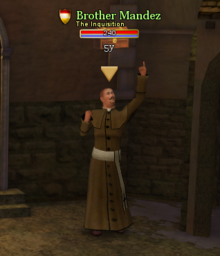
¶ The Knights of St. George
The Knights of St. George are a secretive military order that orginated with the First Crusade, and were founded by the leader of the "German Crusade," Emicho of Flonheim.
Influenced by Peter the Hermit, Emicho had a vision in which Christ appeared to him and promised he would be crowned emperor if he would join the Crusade. He did, and gathered himself an army which followed the Rhine, forcing conversions and massacring those that resisted.
Emicho never reached the Holy Land, but he did start an order of Templars from the ranks of his army. They made it their mandate to protect the sovereignty of the Holy Roman Empire. Also, Emicho began to study the "Egyptian mysteries," believing that they superseded the "superstitions" that had accreted to the one true faith in God.
They existed for hundreds of years in relative obscurity until dwindling out completely. It was only some ten years ago that they were revived again by members of the Hanoverian family. They were so unpopular, however, that they were forced to follow George I to England, as his so called "protectors." Once there, they renewed their vows to protect the reign of the German Emperor.

